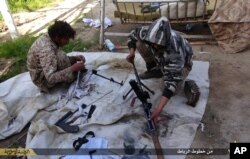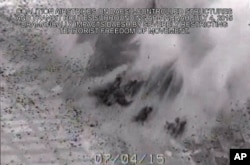Several mass executions by the Islamic State (IS) in Syria and Iraq suggest the terror group is encountering more dissent or at least fears losing its grip on the territory it controls.
In Iraq, the jihadists have released a list of names of more than 1,000 people they have executed during the past few months in the city of Mosul, posting the list on the walls of the group’s religious court.
Hundreds of residents have been checking the names for missing relatives, say local anti-IS activists. Most of the victims were accused of spying or helping Kurdish peshmerga forces.
Beheading
IS beheaded a Belgian jihadist who was convicted of “high treason” for trying to desert on February 26 in Deir ez-Zor in eastern Syria.
According to a local activist network called Deir ez-Zor Is Being Slaughtered Silently, “The group beheaded the Belgian fighter after a Sharia official read a statement to the public, explaining how he tried to escape fighting the enemies of the Caliphate.”
On March 1, the militant group shot dead three foreign fighters, a Tunisian and two Algerians, in the Deir ez-Zor provincial town of al-Mayadeen, claiming they had accepted bribes from locals.
Again, a Sharia court official read a statement before the three were shot, accusing the foreigners of robbery, say local activists.
The three were members of the IS police in al-Mayadeen city. Days earlier, the militants also stoned to death two teenage girls in Deir ez-Zor city in front of hundreds of onlookers.
The 17-year-old and 16-year-old were accused of committing adultery; the men they were alleged to have had improper relations with were flogged and then freed.
Resistance to IS
IS has ruled its self-styled caliphate with an iron and ruthless hand, seeking to intimidate locals into submission. But the latest round of slayings in eastern Syria has not stopped resistance fighters from striking back.
A group of gunmen in Deir ez-Zor city shot dead a leading member of the terror group after abducting him during the weekend. The body of Abu Saleh al-Jazrawi, who was in charge of tax collection in the city, was dumped.
Local activists say IS responded to the killing with a curfew and arrested dozens of people.
The slaying came two weeks after resistance fighters gunned down an IS "emir" in the province, after intercepting his convoy and killing four bodyguards.
Resistance fighters in Deir ez-Zor have killed several IS officials in the past few months in hit-and-run attacks.
“They work in uncoordinated groups,” an activist called Ghaith told VOA. Some of the fighters are believed to be from the Al-Sheitaat tribe. IS killed more than 700 members of the tribe two years ago when it overran much of the province.
Anxious about US ops
Activists say the terror group appears highly anxious about U.S.-led coalition airstrikes targeting IS leaders and the danger of U.S. commando raids, especially in the wake of a special forces operation that captured a senior IS operative during a raid in northern Iraq.
On February 29, U.S. Defense Secretary Ashton Carter said a 200-member Expeditionary Targeting Force is “in position ... having an effect and operating."
A U.S. counterterrorism official told VOA that recent reversals for the terror group in Iraq and the loss of territory in Syria have stressed the militants.
"ISIL’s veneer of invincibility was an allure to would-be jihadists and helped propagate its myth of inevitable victory,” he said. “The group has now suffered a string of setbacks that have eroded that pillar, including the loss of revenue streams from energy resources and the destruction of bulk cash sites. While these blows alone will not serve as a knock-out punch, there’s no doubt that the losses are rippling across ISIL’s self-declared caliphate."
But IS remains a resilient opponent, analysts say, and still maintains an ability to fight on several fronts and to mount offensive operations in different parts of Syria and Iraq.
Battlefield gains
In recent weeks IS has made territorial gains in western Syria; mounted a surprise offensive on the town of Tal Abyad, just north of Raqqa in northern Syria, and maintained a fierce fight with Assad regime forces around the village of Khanaser on the outskirts of Aleppo.
At the same time, it has held off a Russian-backed Syrian government ground offensive in Deir ez-Zor near Al-Taim oilfield.
IS captured several villages this week in Hama province, bringing militant fighters nearer Salamiya, the capital of the country’s Ismaili minority, a group IS considers apostate.
The jihadist advance is prompting fears among the Ismaili that they could face a similar fate to the Yezidis, another minority group IS targeted, executing men and enslaving hundreds of women in 2014.
Ismaili cleric Haidar al-Saleh told local news agencies, “We are aware of the ongoing progress by ISIS, and our community is highly concerned about what would happen if they overran the city.”
VOA National Security correspondent Jeff Seldin contributed to this article.







